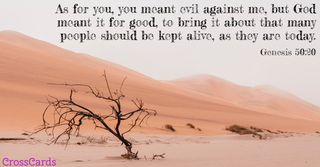
- Recent Translations
- All Translations
Chuàngshìjì 50
Share
Settings
Chuàngshìjì 50 Commentary
Chapter 50
The mourning for Jacob. (1-6) His funeral. (7-14) Joseph's brethren crave his pardon, He comforts them. (15-21) Joseph's direction concerning his bones, His death. (22-26)
Verses 1-6 Though pious relatives and friends have lived to a good old age, and we are confident they are gone to glory, yet we may regret our own loss, and pay respect to their memory by lamenting them. Grace does not destroy, but it purifies, moderates, and regulates natural affection. The departed soul is out of the reach of any tokens of our affection; but it is proper to show respect to the body, of which we look for a glorious and joyful resurrection, whatever may become of its remains in this world. Thus Joseph showed his faith in God, and love to his father. He ordered the body to be embalmed, or wrapped up with spices, to preserve it. See how vile our bodies are, when the soul has forsaken them; they will in a very little time become noisome, and offensive.
Verses 7-14 Jacob's body was attended, not only by his own family, but by the great men of Egypt. Now that they were better acquainted with the Hebrews, they began to respect them. Professors of religion should endeavour by wisdom and love to remove the prejudices many have against them. Standers-by took notice of it as a grievous mourning. The death of good men is a loss to any place, and ought to be greatly lamented.
Verses 15-21 Various motives might cause the sons of Jacob to continue in Egypt, notwithstanding the prophetic vision Abraham had of their bondage there. Judging of Joseph from the general temper of human nature, they thought he would now avenge himself on those who hated and injured him without cause. Not being able to resist, or to flee away, they attempted to soften him by humbling themselves. They pleaded with him as the servants of Jacob's God. Joseph was much affected at seeing this complete fulfilment of his dreams. He directs them not to fear him, but to fear God; to humble themselves before the Lord, and to seek the Divine forgiveness. He assures them of his own kindness to them. See what an excellent spirit Joseph was of, and learn of him to render good for evil. He comforted them, and, to banish all their fears, he spake kindly to them. Broken spirits must be bound up and encouraged. Those we love and forgive, we must not only do well for, but speak kindly to.
Verses 22-26 Joseph having honoured his father, his days were long in the land, which, for the present, God had given him. When he saw his death approaching, he comforted his brethren with the assurance of their return to Canaan in due time. We must comfort others with the same comforts with which we have been comforted of God, and encourage them to rest on the promises which are our support. For a confession of his own faith, and a confirmation of theirs, he charges them to keep his remains unburied till that glorious day, when they should be settled in the land of promise. Thus Joseph, by faith in the doctrine of the resurrection, and the promise of Canaan, gave commandment concerning his bones. This would keep up their expectation of a speedy departure from Egypt, and keep Canaan continually in their minds. This would also attach Joseph's posterity to their brethren. The death, as well as the life of this eminent saint, was truly excellent; both furnish us with strong encouragement to persevere in the service of God. How happy to set our early in the heavenly race, to continue stedfastly, and to finish the course with joy! This Joseph did, this we also may do. Even when the pains of death are upon us, if we have trusted in Him upon whom the patriarchs, prophets, and apostles depended, we need not fear to say, "My flesh and my heart faileth, but God is the strength of my heart, and my portion for ever."
Chuàngshìjì 50 Commentaries
Chapter Summary
INTRODUCTION TO GENESIS 50
This chapter contains a short account of what happened from the death of Jacob to the death of Joseph, and is chiefly concerned with the funeral of Jacob; it first gives an account how Joseph was affected with his father's death, of his orders to the physicians to embalm him, and of the time of their embalming him, and of the Egyptians mourning for him, Ge 50:1-3, next of his request to Pharaoh to give him leave to go and bury his father in Canaan, and his grant of it, Ge 50:4-6 and then of the grand funeral procession thither, the mourning made for Jacob, and his interment according to his orders, Ge 50:7-13 upon the return of Joseph and his brethren to Egypt, they fearing his resentment of their former usage of him, entreat him to forgive them; which they said they did at the direction of their father, to which Joseph readily agreed, and comforted them, and spoke kindly to them, and bid them not fear any hurt from him, for whatever were their intention, God meant it, and had overruled it for good, Ge 50:14-21 and the chapter is concluded with an account of Joseph's age and death, and of his posterity he saw before his death, and of the charge he gave to his brethren to carry his bones with them, when they should depart from Egypt, Ge 50:22-26.
